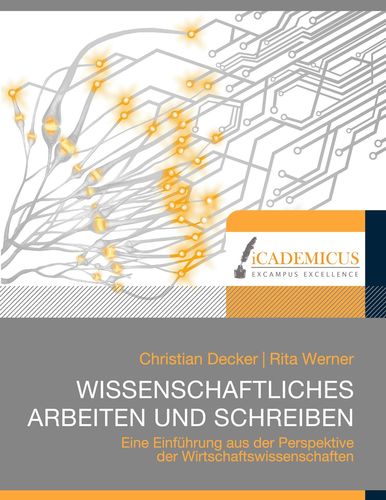
Wissenschaftliches Arbeiten und Schreiben. Eine Einführung aus der Perspektive der Wirtschaftswissenschaften, Frankfurt am Main 2022
Available here

Recently, I have held a number of internal and external higher education workshops.
Due to the suggestions of the participants of the first workshops, I had changed some parts of my concept and was now curious to see how these interventions would be received. Surprisingly for me, those parts that were praised initially were now partially criticized. Also those parts were partially criticized which I had taken up (or changed) due to the wishes of previous participants. On the other hand, parts that I left in the workshop despite criticism from the last time participants were now positively appreciated.
I know these contradictory statements from teaching evaluations of my own courses and lectures at my university:
“It helps that you teach with a headset microphone.” versus “I find it ridiculous and annoying that you teach with a headset microphone.”
“The speed is just right for me” versus “It’s all going way too fast (slow) for me.”
“I find the online units very helpful” versus “I don’t like the online units at all”.
“I think it’s very good how we’re developing the content step by step on the blackboard.” versus “I find it annoying when I don’t get a finished (printed) picture served.”
And so on…
Of course there is a natural dispersion in many aspects of teaching and learning, but especially with polar and conflicting evaluation results one can start to wonder whether one is doing it right or wrong.
What do I personally learn from this?
1) Small group sizes cannot per se convey a representative picture. Each group unfolds a different dynamic, which also results from the interaction of the individual participants. Although this is a truism, we sometimes tend to take criticism personally and/or professionally very seriously. Especially if we have reflected intensively on the instructional design beforehand.
2) It is unlikely that the expectations and needs of all participants can be fully satisfied. Therefore a seemingly unconditional positive feedback should be rather critically questioned. This holds true for the reverse case as well.
3) Diplomatically phrased statements like „I would have wished for…“ indicate individual needs, which do no not have to coincide with the wishes of other participants or the intended learning outcome of the workshop. Each participant has his or her own truth. And this applies to the instructor or coach as well…
Conclusion: Although evaluations and feedback can provide important indications for interventions, the instructor or coach is responsible for a theoretically and conceptually sound workshop concept. Not every criticism or suggestion should lead directly to an intervention.
In other words: Stay true to the intended learning outcome and the corresponding instructional design. Intervene cautiously and not erratically. Do not let yourself be carried away by the wishes of selected participants who speak out loud.
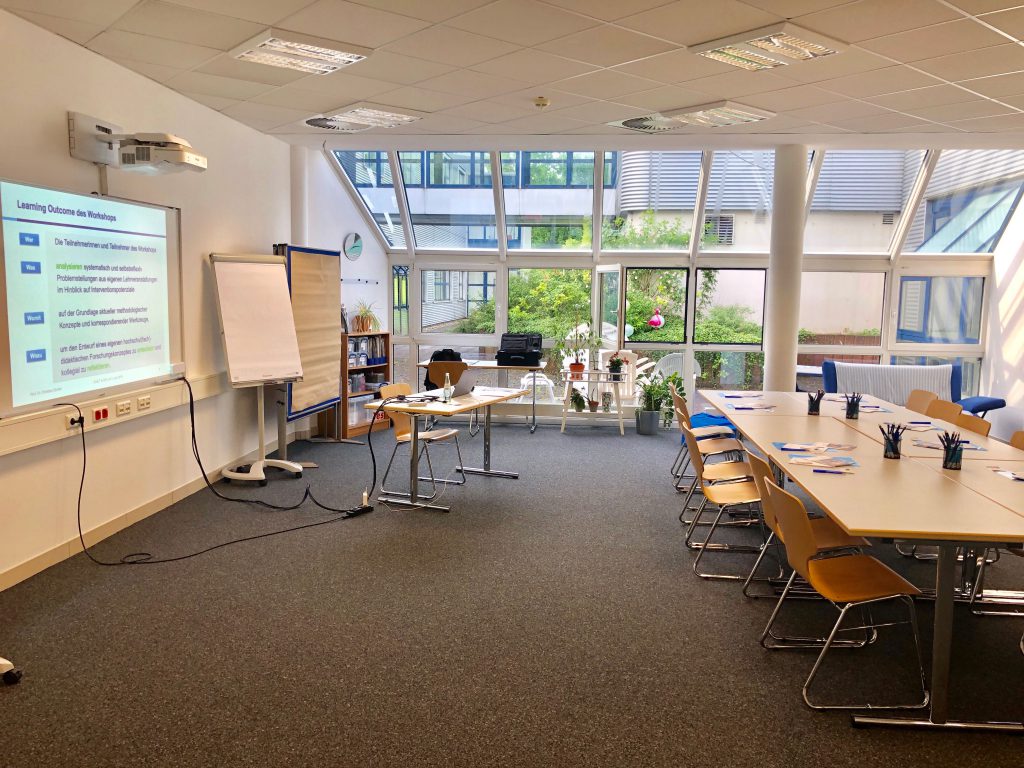
On 3 June 2019, I held a workshop on Scholarship of Teaching and Learning (SoTL) at ExAcT, RWTH Aachen University in Aachen. Together with eleven participants, mainly research assistants, Ph.D. candidates and postdocs, we were exploring aspects of the SoTL concept. As always, it was interesting to see how the participants approached the concept. SoTL is primarily concerned with the systematic inquiry into teaching and learning of students, but essentially postulates a professional attitude. A conceptual introduction cannot replace a more in-depth examination of the methodological and methodical foundations of teaching and learning research. However, it represents the first step towards a changed view of one’s own actions in academic teaching. Ultimately, I received valuable feedback from the participants to further refine the workshop concept. I am looking forward to return to RWTH Aachen in October.
Mucha, A., & Decker, C. (2018).
Das akademische Selbstkonzept als Adventure Capital in explorativen Lernumgebungen. In Problembasiertes Lernen, Projektorientierung, forschendes lernen & beyond: Tagungsband zum 7. Tag der Lehre an der FH St. Pölten am 18.10.2018 (S. 51 – 60). St. Pölten: Fachhochschule St. Pölten.
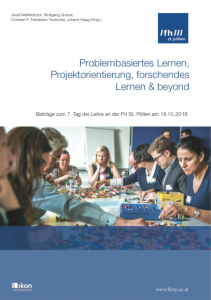
New article:
Mucha, A., & Decker, C. (2017)
Der Dissertationsprozess als explorative Lernumgebung: Warum erfolgreiches Promovieren (auch) eine Frage der sozialen Herkunft ist. In: ZDfm. Zeitschrift für Diversitätsforschung und -management 2(2), 29 – 34.
Link to article (restricted access)
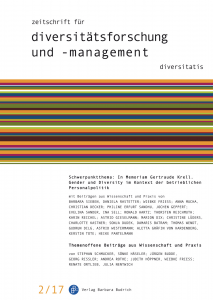
New article:
Mucha, A., Decker, C., & Szmigielski, D. (2017).
Learning-how-to-learn oder Sich selbst eine gute Lehrperson sein. Zu mehr Selbstkompetenz durch Selbstreflexion. In J. Haag, J. Weißenböck, W. Gruber, & C. F. Freisleben-Teutscher (Hrsg.), Deeper Learning – (wie) geht das?!: Tagungsband zum 6. Tag der Lehre an der FH St. Pölten am 19.10.2017 (S. 37 – 47). St. Pölten: Fachhochschule St. Pölten.
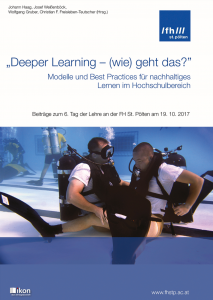
New article:
Decker, C., & Mucha, A. (2017).
Der Lernstilansatz als Inspiration für die universitäre Lehre: Theoretische Grundlagen und exemplarische Anwendung. In B. Berendt, A. Fleischmann, N. Schaper, B. Szczyrba, & J. Wildt (Hrsg.), Neues Handbuch Hochschullehre (Griffmarke A 3.25). Berlin: DUZ.
On 27 September 2017, Anna Mucha and I presented our findings on a research-based learning intervention at the research conference “Forschendes Lernen – The Wider View” which took place at Wilhelms-Universität Münster. In our presentation entitled “Bridging the Gap – From Passive Reading to Active Research”, we elaborated on an instructional design that was introduced in the Corporate Finance course of the Master of International Business Programme (M. Sc.) at HAW Hamburg. The instructional design consists of five core phases:
Phase 1: Transparent explanation of instructional design to students
Phase 2: Reception and reflection of selected seminal papers of Nobel laureates in groups of two students
Phase 3: Development of a new (own) research question
Phase 4: Exploration of the new problem
Phase 5: Presentation of (i) seminal paper and (ii) own research findings to other course participants
The instructional design helps to overcome the gap between reception of research findings (and underlying methods) on the one hand side and production (derivation) of new research findings (using newly acquired research methods) on the other hand side. Thereby, students are guided from “learning about research” via “learning for research” to “learning through research”.
In 2018, a summary of our findings will be published in the conference proceedings.
On 12 and 13 June 2017, I held a workshop on “Online courses in higher education” at Dozierenden-Service-Center (DSC), Universität zu Lübeck. Together with seven participants, I was exploring selected facets of online teaching.
Among others, we did a card assisted brainstorming on identifying characteristics of “online courses”. It still seems to be a challenge to find a consistent idea among a group of informed participants about what characterises an “online course”. Maybe this should not come as a surprise since the term carries many connotations. Moreover, I observed that discussions tend to become more fruitful when moving away from technological aspects while approaching higher education issues (i.e. instructional design aspects).
@ Dr. Bettina Jansen-Schulz: Thank you very much for the invitation and your sympathy and support!
New article:
Mucha, A. & Decker, C. (2017).
(Die Angst vor) Scheitern und Scham in problemorientierten und forschenden Lehr-/Lernszenarien.
In B. Berendt, A. Fleischmann, N. Schaper, B. Szczyrba, & J. Wildt (Hrsg.), Neues Handbuch Hochschullehre. Berlin: DUZ.
New article:
Decker, C. (2016).
Die Posterkonferenz als hochschuldidaktische Methode und Alternative zum Referat.
In B. Berendt, A. Fleischmann, N. Schaper, B. Szczyrba, & J. Wildt (Hrsg.),
Neues Handbuch Hochschullehre. Berlin: DUZ, G 1.2.
New article:
Die fallstudienbasierte Klausur als schriftliche Prüfungsleistung: Ein Beispiel für die kompetenzorientierte Restrukturierung einer Modulprüfung. In J. Haag, J. Weißenböck, W. Gruber, & C. F. Freisleben-Teutscher (Hrsg.), Kompetenzorientiert Lehren und Prüfen. Basics – Modelle – Best Practices: Tagungsband zum 5. Tag der Lehre an der FH St. Pölten am 20.10.2016. St. Pölten: Fachhochschule St. Pölten, S. 77 – 86.
On Thursday, 20 October 2016, I jumped on the night train to St. Pölten in Austria in order to attend a conference on competency-based education (5. Tag der Lehre: „Kompetenzorientiert Lehren und Prüfen“). After a strenuous ride in a very small train compartment, I arrived at the FH St. Pölten in order to discuss various aspects of competency-based education.
For the first time, I participated in a so called “DisqSpace”, a relatively new discussion format that is designed to allow for a higher level of interaction between the presenting speaker and the audience. In each corner of a room, a topic is presented by a guest speaker. All speakers and topics are introduced by a moderator. Thereafter, the participants split up into four groups, which will ascribe themselves to an individual corner (topic). After 15 to 20 minutes the groups rotate and move on to the next “station”. Within 60 to 90 minutes, the audience has visited all corners (topics) of the room.
Advantages
Disadvantages
The poster can be found at slideshare:
As always, the conference was perfectly organized by the friendly team of SKILL @ FH St. Pölten: Thank you very much!
And I really enjoyed the vegan stuffed peppers at the lunch buffet!
The pre-conference interview on “Kompetenzorientierung mit fallstudienbasierten Klausuren” with Christian F. Freisleben-Teutscher and me is now available on YouTube:
More information can be found one the website of “SKILL – Service und Kompetenzzentrum für Innovatives Lehren und Lernen” @ FH St.Pölten.
@ Christian F. Freisleben-Teutscher: Thank you very much for the interview!
On September 13, 2016, roughly a dozen of my colleagues and me attended a three hour workshop on competency-based development of degree programs taught by Prof. Dr. Dr. Oliver Reis (University of Paderborn). We all teach in the degree program “Foreign Trade/International Management” and already apply more or less the principles of competency-based education. However, the workshop aimed at focussing on the overall competency-driven objective of the degree program.
We are now heading towards a (general) competency-based development model that will help us to align the competency-based learning objectives at the level of the modules. Ultimately, this might lead to a (partial) redesign of the curriculum. I will report on the process…
Last week, I held two inspiring workshops on the inverted classroom model for some highly motivated colleagues at Hochschule Ostwestfalen-Lippe. After an unnerving breakdown of my car (transmission failure) at the periphery of Lemgo, I arrived just in time for the start of the first workshop. However, the whole team and the participants were quite empathic and helpful.
During the workshop, we had some lively, productive and insightful discussions that will help me to further refine the workshop concept.
@ Doris Ternes & Melanie Reddeker: Thank you very much for the invitation and your sympathy and support!
Today, I was awarded my certificate of completion in competency-based examination. The last twelve months were packed with seminars, self-study and didactical projects. I experienced a rewarding introduction to a theoretical concept of high practical value. Especially, the discussions with my colleagues were worthwhile and I received a great number of intellectual stimuli. I am looking forward to the implementation and further refinement of this fascinating concept.
@ Oliver Reis: Thank you very much for a year full of insights!
Yesterday, I presented my poster on the competency-based restructuring of one of my courses at an internal conference on “Competency-based teaching, learning and assessment” at Hamburg University of Applied Sciences (HAW Hamburg).
The poster can be found at slideshare:
The interviews with Jutta Abulawi , Petra Naujkos and me are now available on YouTube:
The interviews took place during a workshop on competency-based teaching and learning with Oliver Reis on 19 February 2015.
@ Margitta, Sabine & Ivan: Thank you very much!
The interview is now available on YouTube:
@ Wolfgang Gruber, Christian F. Freisleben-Teutscher, Josef Weißenböck: Thank you very much for the perfect organisation!